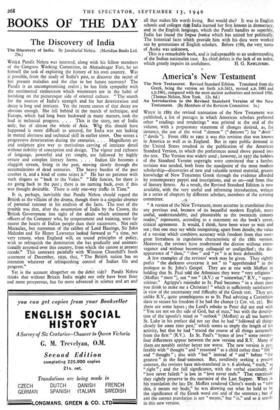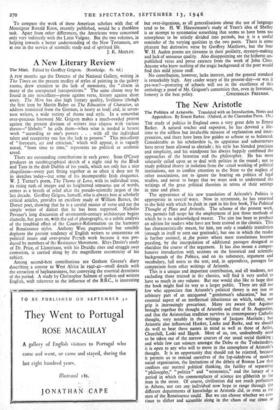America's New Testament
The NeW Testament. Revised Standard Edition. Translated from the Greek, being the version set forth A.D.1611, revised A.D. 1881 and A.D.1901, compared with the most ancient authorities and revised 1946.
(Thomas Nelson, New York. 12s. 6d.) • WHEN in 1881 the revised translation of the New Testament was published, a list of passages in which American scholars preferred other " readings and renderings " was printed at the end of the volume, with a preparatory statement of changes desired, as, for instance, the use of the word " demon " (" demons ") for " devil " (" devils "). From t881 to x9o1 it was this revision that was known in America as well as in England. But in 19or public demand in the United States resulted in the publication of the American Standard Version, in which the preferences noted above passed into the text. The Version was widely used ; however, in 1937- the holders of the Standard Version copyright were convinced that a further revision was needed, both from the standpoint of the most modern scholarship—discoveries of new and valuable textual material, greater knowledge of New Testament Greek through the evidence afforded by contemporary papyri and inscriptions, and so on—and from that of literary fitness. As a result, the Revised Standard Edition is now available, with the very useful and informing introduction, written in a series of chapters by different scholars, members of the revising committee.
" A version of the 14evi Testament, more accurate in translation than any previous and, because of -its beautiful modern English, more useful, understandable, and pleasurable to the twentieth century reader," represents, according to a statement on the book's cover, critical agreement. It would, I think, have been wiser to wait and see ; that one may -say while-recognising, apart from details, the value of a version which combines accuracy with -freedom from that over- great literalness in translation characteristic of the 1881 version. Moreover, the revisers have modernised the diction without extra- vagance and -without becoming colloquial or undignified; the dis- appearance of " thou," "thee " and " ye " is at least defensible.
A few examples of the revisers' work may be given. They rightly prefer " the darkness overcame it not " to " apprehended ' in the prologue to St. John's Gospel. They are at one with Moffatt in holding that St. Paul told the Athenians they were " very religious " (Moffatt " most "), not " too " (A.V.) or " somewhat," R.V., " super- stitious." Agrippa's rejoinder to St. Paul becomes " in a short time you think to make me a Christian! " which is sufficiently satisfactory in view of the uncertainty and difficulty of the Greek text. They are, unlike R.V., quite unambiguous as to St. Paul advising a Corinthian slave to secure his freedom if he had the chance (x Cor. vii. 21). But there are some lapses ; the Lord's rebuke to Peter did not end with "You are not on the side of God, but of man," but with the descrip- tion of the 'apostle's mind or " outlook " (Moffatt) as all too human. St. Luke in his preface did not say that he had " followed all things closely for some time past," which seems to imply the length of his activity, but that he had " traced the course of all things accurately from the first " (R.V.). In St. Paul's " hymn of love " some twenty- four differences appear between the new version and RV. Many of them are notably neither better nor worse. The new version is pre- ferable with " thought " and " reasoned " as a child rather than " felt " and " thought " ; also with " but " instead of " and " before "the greatest " in the finalossentence. But, needlessly seeking a precise contrast, the revisers have mis-translated in v. 6 aletheia, " truth," as " right " ; and the full significance, with the verbal exactitude, of " love never faileth " is lost in " love never ends." That exactitude they rightly preserve-in the narrative of the Last Supper. When in his translation the late Dr. Moffatt rendered Christ's words as " take this, it means my body," he was drawing out what he held to be the significance of the Greek word esti and of the sentence ; but of esti the correct translation is not " means," but " is," and so it stands in this new version. '4."
To compare the work of these American scholars with that of Monsignor Ronald Knox, recently published, would be a thankless task. Apart from other differences, the Americans were concerned only very indirectly with the Latin Vulgate. But the two volumes, in helping towards a better understanding of the New Testament, are at one in the service of scientific study-and of spiritual life.
J. K. MOZLEY.



























 Previous page
Previous page